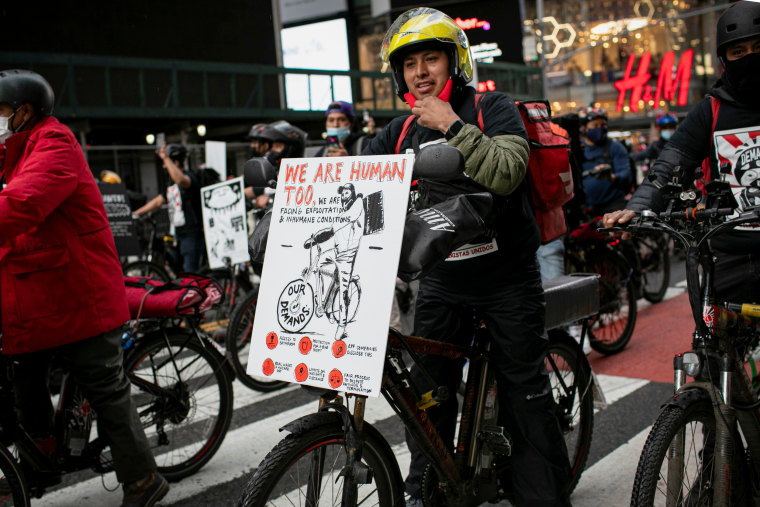Thousands of drivers for delivery and ride-hailing apps staged a work stoppage Wednesday to bring attention to what they say are low wages and dangerous working conditions.
The stoppage targeted trips to and from airports in 10 major U.S. cities: Chicago; Hartford, Connecticut; Providence; Rhode Island; Newark, New Jersey; Philadelphia; Pittsburgh; Tampa, Orlando and Miami in Florida; and Austin, Texas.
Justice for App Workers, a coalition representing drivers and deliverers for the top service-provider apps, said in a news release that from 11 a.m. to 1 p.m. in local time zones, members of the coalition also held rallies at those airports.
Justice for App Workers said Uber and Lyft drivers are receiving “less and less” money from each ride and are increasingly at risk of being victimized by “gun violence and carjackings.”
“While Silicon Valley and Wall Street take an ever-increasing cut of driver earnings, they’re raising rates on passengers, and expecting consumers and workers alike to accept their increasing corporate greed,” the organization said. “The un-unionized and underregulated App industry is deeply exploitative, with App workers denied basic workplace protections standard in other industries such as due process, and instead left to the whims of the algorithm; leaving them at risk of losing livelihoods at the click of a button every day.”
A Lyft spokesperson said in an email: “We are constantly working to improve the driver experience, which is why just this month we released a series of new offers and commitments aimed at increasing driver pay and transparency. This includes a new earnings commitment and an improved deactivation appeals process. Now, drivers will always make at least 70% of the weekly rider fares after external fees. It’s all part of our new customer-obsessed focus on drivers.”
An Uber spokesperson said in an email: “Despite the headlines, we’ve seen no impact to our operations or reliability for riders. In fact, in most markets, there are more drivers on the road today than there were during the same period last week.”
The Valentine’s Day action signals increasing tensions between billion-dollar tech companies and the gig workers whose labor makes those companies possible. Such workers are not unionized and are considered contractors, which means they don’t receive benefits and are vulnerable to loss of income, dangerous conditions and having their accounts with employers unjustly terminated without recourse.
Some politicians and political figures have showed support for the strike on social media, including Rep. Summer Lee, D-Pa., who posted on X: “Uber and Lyft have given rideshare workers the short end of the stick for far too long. Prices continue to rise while drivers are left with a smaller and smaller cut of the pie.”
Antonio Arellano, the vice president of communications for the youth voter organization NextGen America, also posted on X: “Drivers for Uber, Lyft, and DoorDash, shouldn’t have to work 80 hours/week just to make ends meet.”
Delivery drivers in the U.K. for Uber Eats, Deliveroo, Just Eat and Stuart said they would turn off their apps and refuse deliveries from 5 p.m. to 10 p.m. The group Delivery Job U.K., which called for the walkout, said on Instagram that the strike was “a crucial opportunity to be seen and heard by society.”

